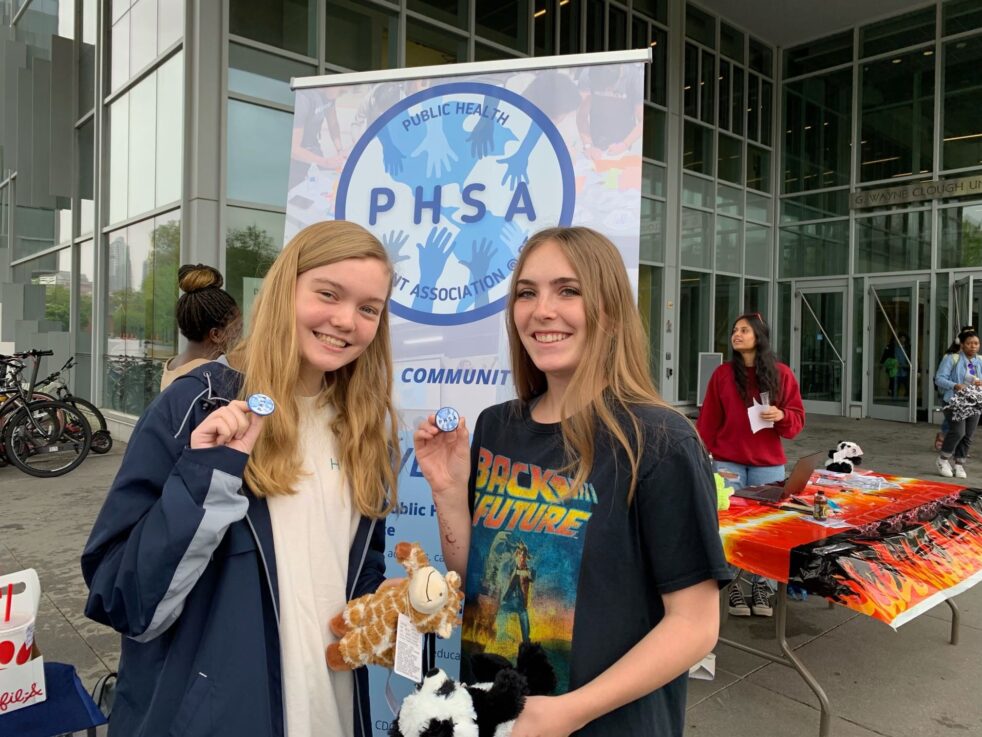On Monday, April 3 at 11 a.m. the Institute took a critical step in the direction of eliminating period poverty. The event, Period Palooza, provided free reusable menstrual products to students in order to promote equitable access, sustainability and awareness as it relates to menstruation.
The Technique reached out to Aderinsola Aladesanmi, third-year PUBP, President of Public Health Student Association (PHSA) and Public Health Committee Chair for the Student Government Association (SGA), for more information on the tabling event. The tabling was a joint effort between PHSA, SGA and RISE, the Women’s Resource Center’s (WRC) first-year leadership organization. Each organization contributed to the program’s initiatives from their unique perspectives.
For example, in addition to providing sustainable products, according to Aladesanmi, SGA “wanted to increase student awareness of the ongoing Menstrual Product Program (MPP)” that sees SGA partnering with Tech Facilities to ensure all bathrooms on campus are stocked with single-use menstrual products, accessible to
students at no cost.
PHSA sought to use the event to spread campus awareness of its organization and, most importantly, the services they provide to students — often free of charge.
“We purposefully hosted the event on the first day of National Public Health Week, as we did a whole week of programming for students,” Aladesanmi said.
With such ambitious goals, the bar was set high. However Aladesanmi believed all the goals were accomplished.
“All of the menstrual cups we had were gone within one hour of the event, and many students learned about other types of reusable menstrual products, such as menstrual discs, that they had previously never heard of. Additionally, we have continued receiving emails from students interested in MPP in terms of how they can help and ways they believe the program can grow.”
Although items at the event “sold out” quickly, it was planned almost a year in advance. Aladesanmi explained that PHSA began coordinating the events for National Public Health Week during the Fall 2022 semester; more precise details such as ordering specific products were finalized in the spring.
When asked about the importance of the event and why it might be different from any other giveaway, Aladesanmi explained the unique need for menstruation products, citing them as a basic human need that often goes unmet.
“While many Tech students do have the resources to buy menstrual products, other students do not,” she said. “Further, the lack of access to affordable menstrual products is exacerbated by the ‘tampon tax’ — the phenomenon where menstrual products are taxed at higher rates as they are coded as ‘luxury items,’ despite being an absolute necessity for all menstruators.”
The luxury tax, also known as a “period tax” or “tampon tax,” varies from state to state. As of 2022, menstruation products are considered a luxury along with items such as jewelry or perfume; however, many of these taxes are implemented at the city or county level, posing another barrier to their access.
In some states such as Indiana, Mississippi or Tennessee, the tax can be as high as 7%.
Aladesanmi continued to explain how the MPP’s efforts fit within this framework of working towards equity.
“Providing students with free menstrual products allows us to decrease at least some financial burden students may experience and ultimately work towards decreasing period poverty. Additionally, reusable menstrual products are a feasible swap from single-use menstrual products that end up saving the user lots of money and [help] the Earth by reducing waste,” she said.
Additionally, Aladesanmi explained that having public events on campus can be important as they “are crucial to destigmatizing and normalizing menstruation — on-campus and, more broadly, in our world.”
The event was funded through the MPP’s $30,000 grant that was awarded in 2019 due to the hard work of previous students like Niveda Shanmugam, William Harrer and Alex Cascado — co-chairs of the Cultural and Diversity Affairs Committee and Vice President of Student Life, respectively.
According to Aladesanmi, this funding was critical to taking the partnering organizations’ plans and putting them into action. She also noted they were “very fortunate” for donations made by the WRC.
Turning her attention back to the Institute, Aladesanmi explained having student engagement can be just as important as having the backing of administration.
“On the Institute’s side, it’s important to see the types of initiatives that have significant student buy-in in order to properly prioritize Institute spending and align it with student interest and well-being. I’m definitely very thankful that this is an initiative where students and administration can agree on the importance and benefit to students.”
Lastly, Aladesanmi took a moment to acknowledge the many campus organizations that contributed in one way or another throughout the process.
“Many other organizations and departments kindly shared the information about the event with their members such as SHE for Women, the Pre-Health Office and many others,” she said.
Students can read more about the history of MPP and how they can get involved if they are interested at mpprogram.gatech.edu.
